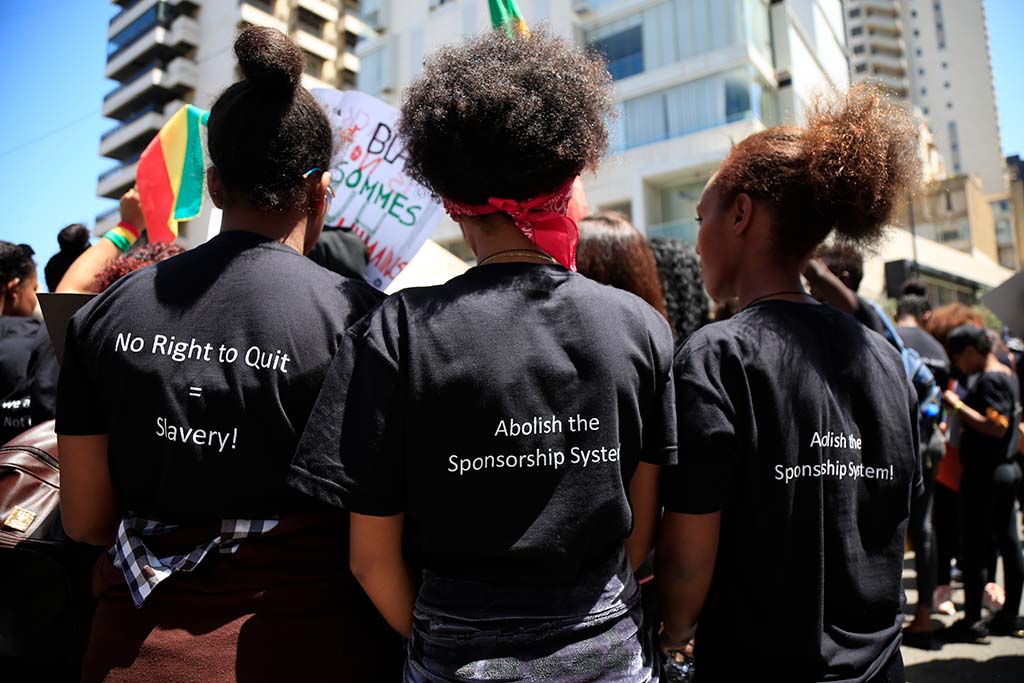Abolishing modern slavery in Lebanon
The Kafala system, a sponsoring system, is trapping women in modern household slavery and exploitation. The women’s rights organisation KAFA is working tirelessly to change the law and support women in need.

In the early 2000s, Ghada Jabbour and her colleague realised they had a more radical approach to women’s issues and wanted to act on it. Together, they decided to start KAFA (enough) Violence & Exploitation—one of The Kvinna till Kvinna Foundation’s partner organisations in Lebanon.
KAFA focuses on the issue of violence against women but also trafficking, sexual exploitation and child sexual abuse. Today, Ghada is the head of the unit that works with exploitation and trafficking.

Ghada Jabbour, head of the exploitation & trafficking unit at KAFA.
Domestic workers trapped
The Kafala system is a system that, technically, does not exist in law. Instead, it is a set of practices by law enforcement that ties a domestic worker to her employer.
The employer is responsible for the domestic worker’s residency and work in the country. Without a workplace, the domestic worker has no status and is faced with arrest and deportation.
“The domestic worker has no right to resign from the employment, which any worker should—they should have the right to withdraw their labour,” Ghada says.
If the domestic worker wants to change employer, she needs to convince her employer to prepare a notarised release paper stating that he/she releases her to another employer—a scenario that is not plausible to happen. Also, if she wants to leave Lebanon because of abuse or any other reason, she needs be in possession of her passport and residency card, which in most cases, are withheld by the employer.
“People call this sponsorship system ‘modern slavery’. It binds women to employers and it’s very difficult to escape this bond.”
Abolishing the system
KAFA is demanding that domestic workers should be included under the labour law, which would recognise domestic work as decent occupation. In effect, that would weaken the sponsorship system by granting the workers the right to terminate their contract. However, this alone will not be enough to end the Kafala system.
“Parallel to the sponsorship system, you have the recruitment processes. During recruitments, there are a lot of abuse against and deception of domestic workers.”
Coming to Lebanon, many domestic workers are promised better salaries. But they are misled and not properly informed about the sponsorship system and the fact that they cannot withdraw their labour. They are also not informed about the conditions of the work, the nature of the household or how many family members there are.
Prostitution as a form of violence
Many domestic workers who leave a household end up being caught in other forms of violence and exploitation, like prostitution.
There are very different views on prostitution in Lebanon. KAFA is working on establish it as a form of violence against women and wants to provide support to anyone who wants to exit. KAFA wants to see penalisation for the ones who abuse the vulnerability of women and profits from their prostitution such as pimps and facilitators, and sex buyers.”
Making a difference
The change that KAFA works towards doesn’t happen overnight. In reality, it can take years or decades before a law is passed.
“It can create a lot of frustration because you feel like you’re banging your head against the wall. The system is there, completely locked.”
Ghada explains that when they work with women, they often feel that the access to justice is difficult because there are no protective laws. Despite this, they still manage to change lives for the better.
“When you succeed in helping a woman, all the frustration that you have accumulated can be erased in a second. You feel like you’ve done something, and even if it’s a limited number, those successes are important and keep us going forward.”
The Kvinna till Kvinna Foundation has supported KAFA and worked for women’s rights in Lebanon since 2005. We support and work together with several local women’s rights organisations to end violence against women and defend women’s human rights.
Learn more about KAFA
The exploitation & trafficking unit at KAFA work with different levels of intervention and services to support women in need: a helpline; a shelter for trafficking victims; public education and awareness; advocacy; and capacity building.
Lifesaving services
During 2021, the exploitation & trafficking unit at Kafa supported 430 women either through the helpline, the shelter, or the case management. Despite the financial crisis in the country, lack of electricity at times, closed roads, political instability and covid-19 pandemic, KAFA has not shut down their services once.
Changing the public’s perception
Through public education, KAFA wants to change the perception of exploitation and trafficking. They raise awareness and educate the public about the realities of prostitution, for example, about the obstacles women in prostitution are faced with.
Tackling legal gaps through advocacy
KAFA has been building a public opinion against the Kafala system since 2010 to eliminate the legal gaps and practices that allow women to be exploited.
Education is key
KAFA organises trainings for, among others, police and law enforcement officers, humanitarian personnel and frontline workers—all of whom meet victims of exploitation within their professions.